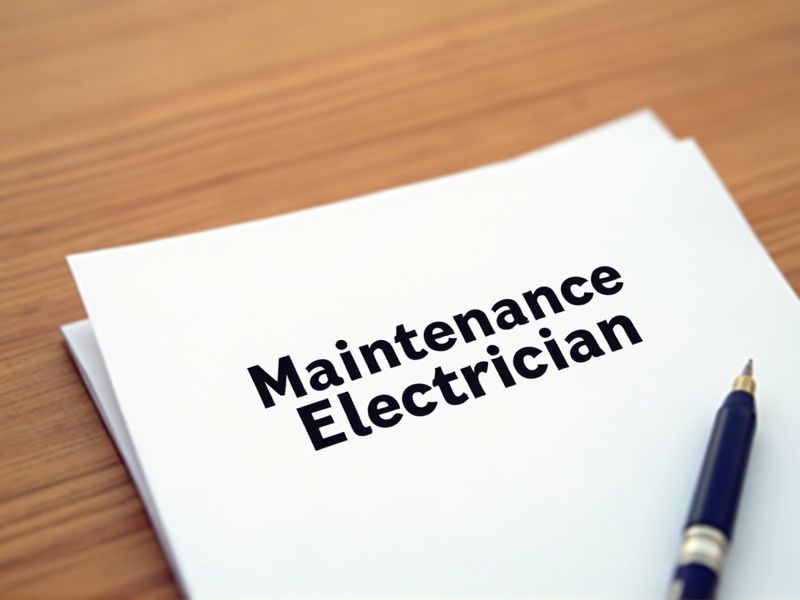
In the field of electrical maintenance, safety and efficiency are paramount, necessitating specific certifications for electricians. These certifications ensure that professionals are equipped with the skills to handle complex electrical systems and adhere to industry standards. They also provide assurance to employers and clients about the electrician's competence and reliability. Important certifications you may need as a Maintenance Electrician include those related to safety regulations and technical proficiency.
Journeyman Electrician License
A Journeyman Electrician License provides assurance of a standardized skill set and knowledge level that is necessary for safety and compliance in electrical work. The license ensures adherence to national and local electrical codes, reducing the risk of electrical hazards. Employers often require the license as it signifies a professional level of expertise, increasing trust in maintenance tasks. Also, it is legally required in many areas for liability reasons, protecting businesses and workers from potential legal issues.
OSHA 10-Hour Construction Safety Certification
The OSHA 10-Hour Construction Safety Certification educates maintenance electricians on essential safety protocols, reducing the likelihood of workplace accidents. This certification often meets employer and regulatory requirements, ensuring compliance with safety standards. By understanding potential hazards, electricians can implement preventative strategies, promoting a safer work environment. The credential enhances an electrician's professional credibility, increasing job opportunities within the construction industry.
OSHA 30-Hour Construction Safety Certification
The OSHA 30-Hour Construction Safety Certification provides maintenance electricians with comprehensive knowledge to identify and mitigate workplace hazards, reducing the likelihood of accidents. This training is crucial because electricians often work in high-risk environments where electrical and construction-related dangers are prevalent. Understanding OSHA safety standards ensures compliance with federal regulations, which can prevent costly fines and enhance workplace safety. Employers often require this certification to demonstrate a commitment to a safer work environment and to ensure that electricians are equipped with essential safety practices.
NFPA 70E Electrical Safety Certification
Maintenance electricians need NFPA 70E Electrical Safety Certification to understand electrical safety standards and reduce the risk of workplace injuries. Compliance with NFPA 70E ensures electricians are trained to prevent electrical arc flash and shock hazards. Certification helps in maintaining a safe work environment by educating electricians about safe work practices and proper use of personal protective equipment. Employers often require this certification to ensure adherence to legal and safety regulations during electrical maintenance tasks.
Lockout/Tagout (LOTO) Certification
LOTO certification ensures that maintenance electricians understand and apply necessary safety protocols to prevent accidental machine start-ups. Without certification, there's a higher risk of electrical accidents which can lead to severe injuries or fatalities. Certification also ensures compliance with OSHA regulations, mitigating potential legal liabilities for employers. Knowledge in LOTO procedures enhances operational efficiency, reducing downtime associated with unexpected equipment malfunctions.
National Electrical Code (NEC) Training Certification
National Electrical Code (NEC) Training Certification equips maintenance electricians with critical knowledge of safety standards and compliance requirements, reducing the risk of electrical hazards. Certification enhances their ability to perform tasks accurately, ensuring system reliability and operational efficiency. It improves job opportunities and career advancement by validating their expertise to potential employers. Compliance with NEC facilitates adherence to legal and regulatory requirements, minimizing liability issues for both the electrician and their employer.
Programmable Logic Controller (PLC) Certification
Obtaining a PLC certification enhances a maintenance electrician's technical competence in automated systems, increasing their ability to diagnose and repair complex machinery efficiently. Increased understanding of PLC systems directly correlates with reduced downtime and improved operational productivity. Certified electricians often command higher salaries and positions, as they bring validated skills that are essential for high-tech industrial environments. Employers benefit by ensuring compliance with industry standards, reducing the risk of costly errors attributed to inadequate training.
Certified Maintenance & Reliability Technician (CMRT)
The CMRT certification ensures that maintenance electricians have standardized skills and knowledge, increasing efficiency and reducing downtime in industrial settings. This certification validates expertise, positively impacting the reliability and performance of equipment. Employers see a decrease in unexpected failures and costly repairs as certified personnel leverage best practices. CMRT-certified electricians typically lead to a safer work environment through adherence to structured maintenance processes.
Industrial Electrical Troubleshooting Certification
Obtaining an Industrial Electrical Troubleshooting Certification enhances a maintenance electrician's ability to diagnose complex electrical systems efficiently, reducing downtime and improving productivity. This certification often leads to a deeper understanding of modern electrical technologies, which are frequently encountered in industrial settings. Employers value certified electricians because they demonstrate a commitment to professional development and can contribute to workplace safety by adhering to updated industry standards. The certification provides a competitive edge, often resulting in better job prospects and potential for career advancement.
Energy Management Systems (EMS) Certification
Earning an Energy Management Systems (EMS) Certification equips the maintenance electrician with advanced knowledge to optimize energy use effectively. This certification empowers them to diagnose inefficiencies and implement strategies that reduce operational costs. Enhanced skills in EMS lead to improved system reliability and prolong equipment lifespan, minimizing downtime. Compliance with industry standards through certification increases job security and opens opportunities for career advancement.
Summary
When you, as a Maintenance Electrician, obtain certifications, your job prospects significantly improve. Certifications validate your skills, making you more attractive to potential employers. You might also see an increase in your earning potential due to the specialized knowledge you bring. The formal recognition of skills often leads to opportunities for career advancement and higher responsibility roles.
